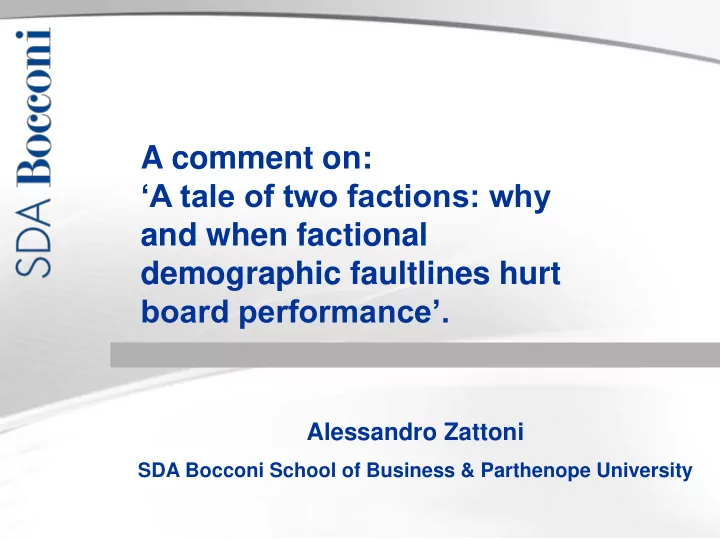

A comment on: ‘A tale of two factions: why and when factional demographic faultlines hurt board performance’. Alessandro Zattoni SDA Bocconi School of Business & Parthenope University
Index • Paper in one page • Theoretical development • Method • Discussion
Paper in one page RQ: why and when demographic differences between board members negatively affect board performance Theory: Factional + Faultine - Board Demographic Activation Performance Faultline - Board Reflexivity survey to members of Dutch pension funds’ boards Data: (754/2,917 members, 353/541 boards – 318 with multiple) Results Results support all relationships. Discussions i) social categorization plays an important role; ii) the study shows when faultilines are activated.
Theoretical development (1/3) I. Board reflexivity is a new construct (i.e. ‘the extent to which a board actively reflects on its functioning and adapts its functioning accordingly’), never explored before in BoD literature (I found just one paper in a practitioner journal). It is interesting to create a link with other disciplines and related constructs, but there are also risks. To this purpose, authors should be very clear and convincing in explaining: - What are the advantages to include this construct instead of more established ones in C and BoD literature? - What is the link of this construct with other potentially related constructs used by CG and BoD scholars? - Can you use other variables more related to board and CG literature (e.g. board evaluation or self-assessment, board meetings)?
Theoretical development (2/3) II. Board members have high legal responsibilities. Authors should consider that board members differ from other work groups because of their legal status. - What are the most important dimensions of board diversity that create faultlines? - How much relevant is developing the story about the divergence of interests of directors? - You can consider that when directors have highly diverging interests (e.g. JV), they tend to use some legal mechanisms to solve or regulate them outside or within the board (e.g. Ravasi and Zattoni, 2006). - Can directors fiduciary duties of loyalty and care regulate or moderate potential conflicts of interest?
Theoretical development (3/3) III. Can we assimilate workgroups or even TMT to board of directors? Authors should consider the board’s peculiarities into their story. - larger size - part-time role of members - asymmetry of information and power between insiders and outsiders - few meetings and limited interactions
Method I. Sample - the unit of data collection: board vs board members (C, CEO, D) - the final sample: 318 boards with multiple answers, 121 with one evaluation of board processes and 197 with multiple, 271 with three years of investments decisions - why to consider only boards with both employers and fund participants? - time frame: board vs return on investment II. Return on investment - Why to use two years of ROI if you collect three years data? - Why not to use the return of the pension fund vs a benchmark (equity, bonds and real estate have different returns and risks)? - Cannot we hypothesize a reverse causality in boards (i.e. boards split in factions when performance is weak)? III. Demographic faultlines - Are age and sex more important than professional, educational and functional background?
Discussion (1/2) I. Authors could provide a better contextualization of the study in term of: - which are the main differences between pension funds and industrial or financial firms (e.g. regulation, culture)? - which are the main differences between boards of pensions funds and boards of industrial and financial companies? The contextualization will help authors to better position the contribution, to develop a coherent and richer story, and to identify limitations.
Discussion (2/2) II. Authors could better link their research to literature and previous studies on board process and effectiveness: - how to better link with and contribute to literature and studies on board diversity? - how to better link with and contribute to literature and studies on board processes? - how to better link with and contribute to literature and studies on board performance? There is still some work to create a better link and to clarify and develop the contribution to literature and previous studies on board composition, processes and performance.
I hope these comments will help the authors with the development of their study.
Recommend
More recommend